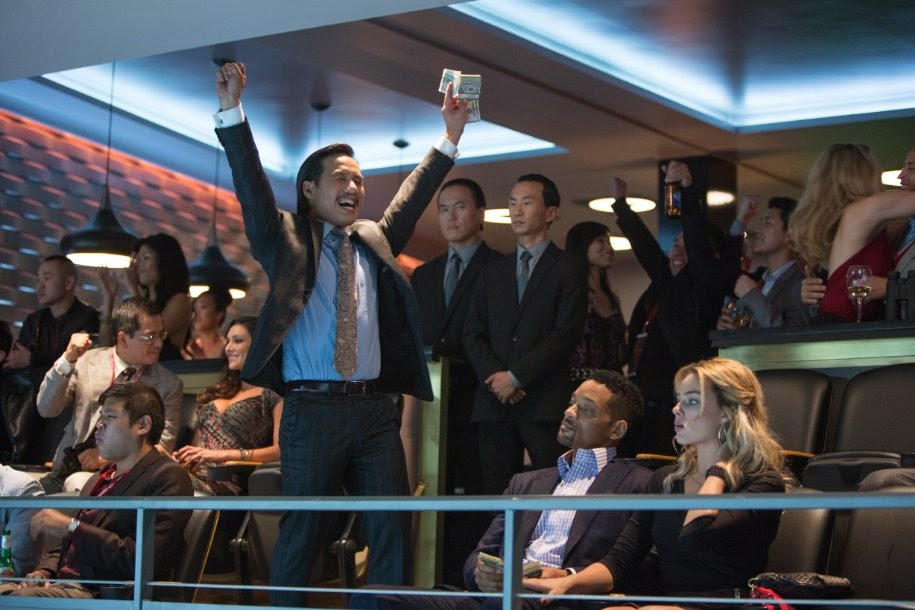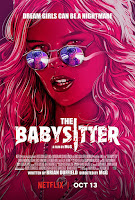Blade Runner 2049
Blade Runner 2049
Directed by: Denis VilleneuveWritten by: Hampton Fancher & Michael Green,
based on a short story by Philip K. Dick
Starring: Ryan Gosling, Harrison Ford,
Robin Wright, Ana de Armas, Sylvia Hoeks
and Dave Bautista
Rating: 14A
Release Date: October 6th 2017
 |
| Ryan Gosling and Ana de Armas try to write a story using only the letters GATC and the numbers 1 and 0 in Blade Runner 2049 |
The behemoth that has become the entertainment industrial complex is slowly phasing out the avant garde classics of yesteryear. Although the rare gem of originality and importance like Get Out still make it to the mainstream, and there are some recent art house flicks like Lady Bird that make a splash, it is still rare that a film with substance, intelligence and artistic merit makes it to the multiplex. Furthermore, it's even rarer a sequel, reboot, reimagining or whatever else you want to call it is even good - let alone spellbinding. Blade Runner 2049 is all of those things, and the exception to every rule. Under the canvas of a thirty year old science fiction classic, director Denis Villeneuve continues his string of cinematic triumphs, crafting a multilayered story that touches on the human condition, finding meaning in the void, and asks if being human is merely a biological fact or an ideal that anyone, (or anything) can strive towards.
Blade Runner 2049 takes place thirty years after the original film's story, (the original film came out 36 years ago), and follows "K," (Ryan Gosling), a member of the LAPD and 'blade runner'; someone who hunts down old, rogue androids/replicants or 'synthetic humans' and 'retires' them via a bullet to the brain. This is similar to Harrison Ford's Rick Deckard in the original; a human being, (or so we're led to believe), who was also tasked with hunting down replicants who decided they wanted more out of existence than slave labour. The only difference is that in the decades since the original film, much has changed in the world of Blade Runner - the synthetic humans have been programmed to not fight back, there was a great 'blackout' that sent half the world into poverty and turmoil, and that truth is close so close to fiction it's difficult to tell the two apart. Even K's boss, Lieutenant Joshi, (Robin Wright), has a hard time telling whether or not her feelings towards K are merely a physical attraction to an unrealistic representation of the male form, (K is a replicant himself), or something closer to love. Above the walled off world of a Los Angeles that looks more like a country than a city, is Niander Wallace, a brilliant engineer, and creator of modern replicants. As we watch the film progres, it becomes clearer and clearer that Wallace fancies himself a god; striving to be an immortal hybrid of Ozymandias and Icarus, never breaking his Narcissus-like, near omnipresent gaze with himself to understand the ironic and tragic ends to the myths he idolizes. If that seems like a lot to chew on - it is.
Blade Runner is a surprisingly intelligent, complex, deeply plotted, and extremely philosophical love letter to the human condition - through the eyes of what is ostensibly a robot*. While it doesn't demand a viewer to have seen the original to understand 2049's plot, it does demand strict attention to detail, as the smallest character eccentricities within the story later end up revealing essential components of important details. While I wasn't too keen on the original, (to be fair, I saw it at a young age, and have only seen the Final Cut which is one of five cuts of the film), Blade Runner 2049 is right up there with Godfather II, as a sequel that not only outshines its brilliant predecessor, but stands on it's own as a cinematic triumph. There's more than one reason for that.
Denis Villeneuve is probably the most exciting filmmaker in popular cinema right now; hot off the success of his shocking and challenging Prisoners, he catapulted himself into auteur status with the weird Enemy, the taut Prisoners and the explosive and brilliant Arrival, (2017 Best Picture nominee). With Blade Runner, Villeneuve is able to focus his precise cinematography, (with help of legendary cinematography Roger Deakins), on the dusty, neon-lit atmosphere of a future plummeting into dystopia. The set decoration, set design, costumes, and digital effects too, all meld to showcase a wholly believable world of an alternate Los Angeles that doesn't seem too far off in the future. The entire film is a visual orgy of creativity, color and relentless violence. Villeneuve, at the helm, brings everyone together to create a singular verisimilitude of cinematic brilliance.
None of the spellbinding visuals, however, would work without a cast believable enough to inhabit the world of Blade Runner. Gosling, who has proved himself to be one of the most capable actors of his generation with films like Half Nelson, Drive, The Nice Guys, The Ides of March, the Big Short and last year's La La Land, once again delivers a nuanced, challenging and compelling performance. Robin Wright, fresh off a killer supporting role in the fantastic Wonder Woman, is again exemplary in a role portraying a tough as nails police officer who answers to no one. Ford, seeming to have fun as of late revisiting his best roles, is an unsurprisingly electric force when he finally appears onscreen. At 76, his charisma is still undeniable. Additionally, the supporting roles filled by Barkhad Abdi, Mackenzie Davis, Ana de Armas, a surprisingly vulnerable Dave Bautista, a ruthless Sylvia Hoeks and a downright creepy Jared Leto make the entire cast a believable glimpse into a world of memorable and dangerous characters. It's fantastic work from a skilled set of thespians.
Finally, to say that reviving a story that was first onscreen almost forty years ago, and was based on a long dead sci-fi novelist's short story, (Philip K. Dick's Do Androids Dream of Electric Sheep?), is difficult, is one hell of an understatement. Sharing a co-writing credit with Hampton Fancher, screenwriter Michael Green wonderfully combines the source material, the original film and a cavalcade of original ideas to create a compelling, moving and deeply inquisitive story that asks tough questions. It's masterful work. It's not difficult to adapt Dick's stories into decent movies or series; Blade Runner, Total Recall, Minority Report, A Scanner Darkly, The Adjustment Bureau, and the Man in the High Castle were all short stories or novels by the prolific writer, who passed away in 1982. What's so masterful is that Fancher is able to convey such originality using Dick's story as just the foundation.
Overall, Blade Runner 2049 is a magnum opus of a film, and a cinematic achievement that is able to stand on it's own and break out of the pitfalls of most film sequels. At nearly three hours, (two hours and forty four minutes), the film breezes by and doesn't waste a second of it's patience testing time frame; it's one of the few recent blockbusters that actually earns and deserves it's lengthy running time. The cinematography, acting, writing and countless other facets of filmmaking all fall under the wise and artistic vision of Villeneuve, who has once again proved himself to be a master of his craft. Bold, gorgeous, cinematic, philosophical, and starkly violent, Blade Runner 2049 is a definitive neon-noir genre picture, and one of the best major releases of 2017.
GRANT'S RATING: 5/5 STARS
Ryan Gosling in Blade Runner 2049: "Baseline"
*From what I gathered in Blade Runner 2049, replicants aren't really robots or humans; they're flesh and blood reinforced by genetic engineering. and can be programmed like a robot. In short, they're pretty much super strong designer-made humans that are programmable, made in a lab, fully mature and ready for work on delivery.



Comments